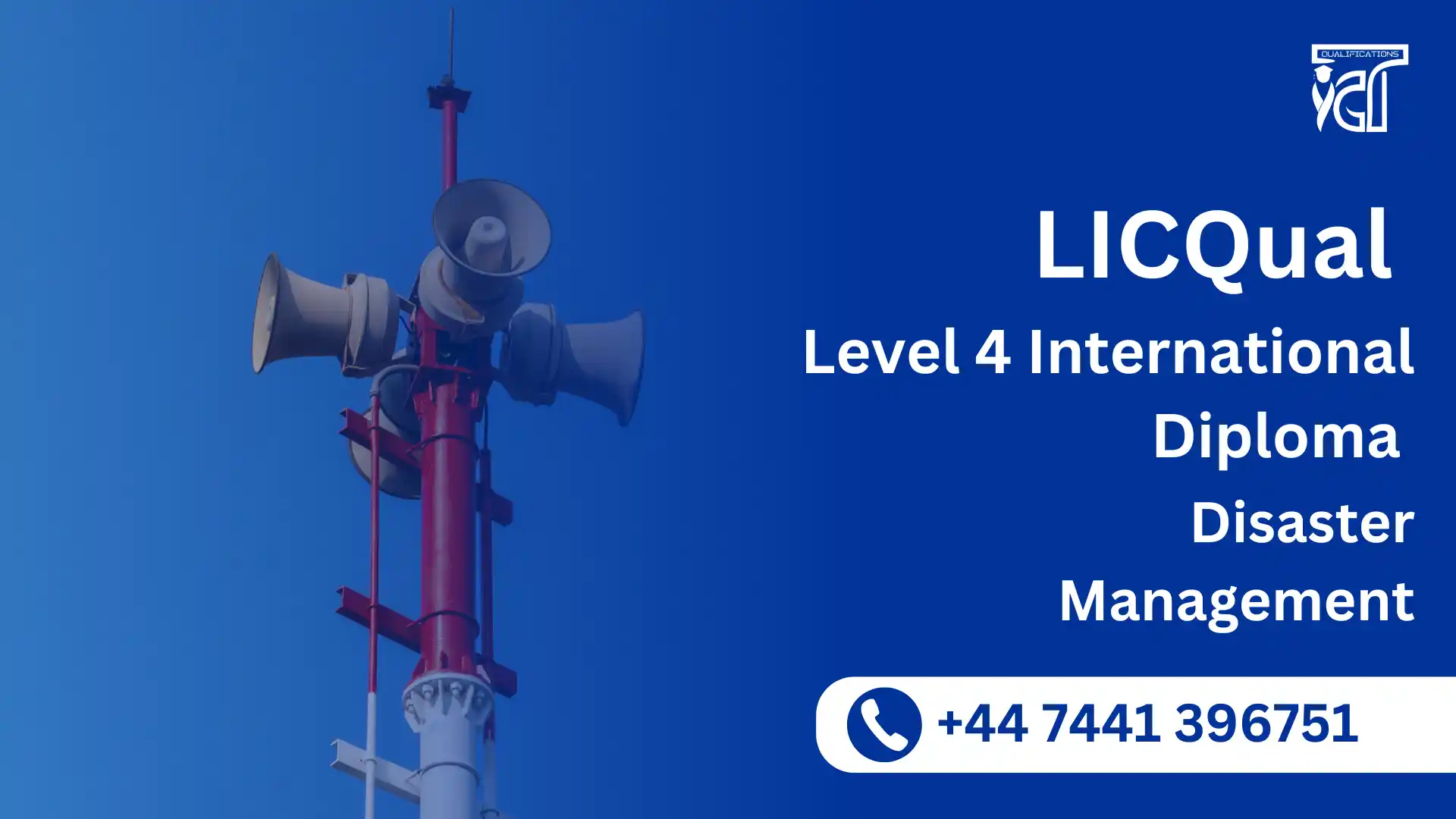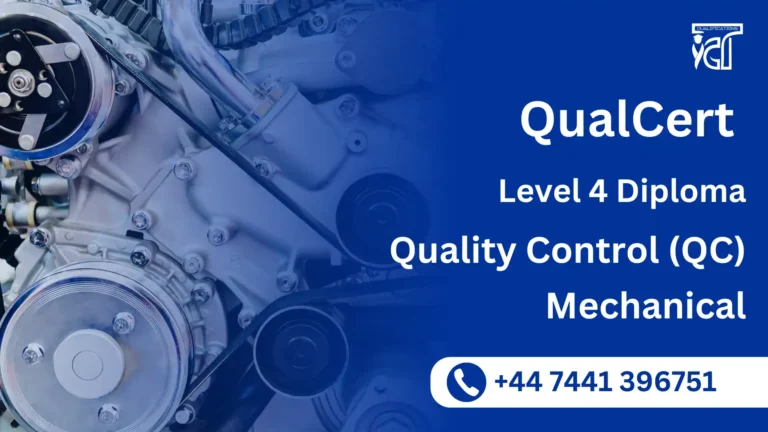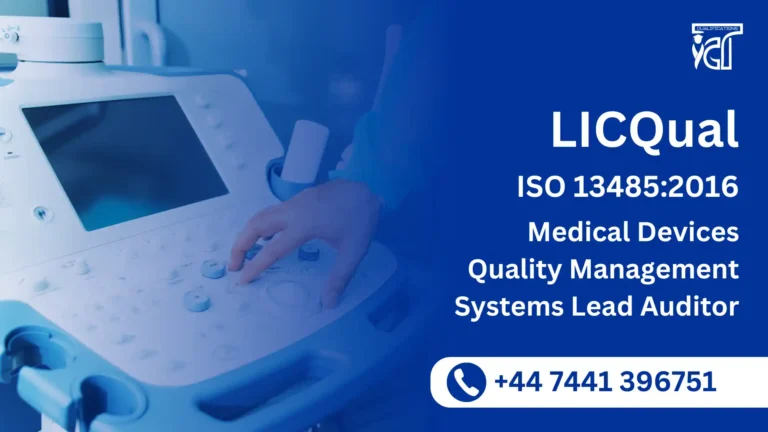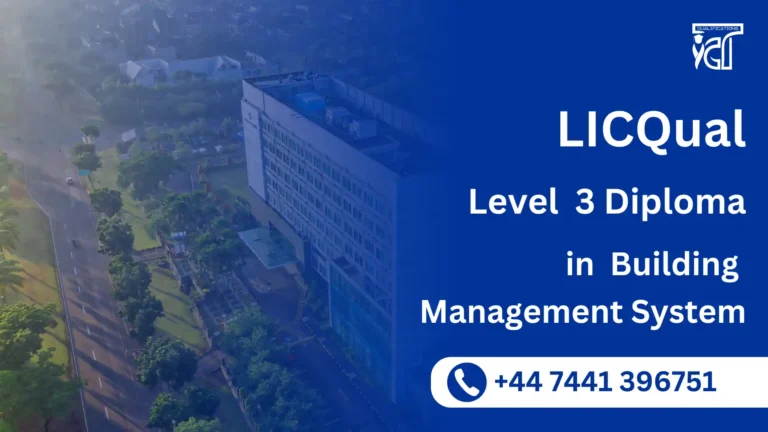The LICQual Level 4 International Diploma in Disaster Management is an advanced professional qualification designed to build upon foundational knowledge and provide in-depth expertise in the field of disaster risk reduction, emergency planning, and crisis leadership. This internationally recognized diploma is ideal for individuals working in disaster response, humanitarian aid, emergency services, civil defense, and related sectors who seek to take on leadership or coordination roles in disaster management operations.
As global threats from climate change, pandemics, natural disasters, and humanitarian crises continue to escalate, the demand for skilled disaster management professionals has grown significantly. The LICQual Level 4 International Diploma in Disaster Management is tailored to meet this demand by equipping learners with a strategic understanding of disaster preparedness, mitigation, response, and recovery within both local and international frameworks.
The LICQual Level 4 International Diploma in Disaster Management goes beyond basic disaster management principles and introduces learners to advanced risk assessment models, multi-agency coordination, disaster logistics, and leadership in high-pressure situations. Learners will explore real-world case studies, international protocols (such as those by the UN, WHO, and IFRC), and ethical considerations involved in disaster response.
Whether responding to earthquakes, managing refugee crises, or leading community disaster preparedness initiatives, this LICQual Level 4 International Diploma in Disaster Management prepares learners to act decisively, responsibly, and collaboratively. It also promotes a holistic approach to disaster resilience, integrating technical, social, environmental, and governance aspects of emergency management.
The LICQual Level 4 International Diploma in Disaster Management is ideal for professionals aiming to expand their influence, lead disaster response teams, design contingency plans, and contribute to building safer and more resilient communities on a national or global scale.
LICQual Level 4 International Diploma in Disaster Management
The Study Units of LICQual Level 4 International Diploma in Disaster Management are as :
| Unit Ref# | Unit Title | Credit | GLH |
| LICQ2200007-1 | Overview of Disaster Management | 10 | 50 |
| LICQ2200007-2 | Disaster Management Approaches: Preparedness, Response and Recovery | 10 | 50 |
| LICQ2200007-3 | Natural Hazards and Resilient Communities | 10 | 50 |
| LICQ2200007-4 | Geospatial Techniques in Disaster Management: A Critical Introduction | 10 | 50 |
| LICQ2200007-5 | Leadership in Disaster Management | 10 | 50 |
| LICQ2200007-6 | International Collaboration in Disaster Management | 10 | 50 |
GLH (Guided Learning Hours) and TQT (Total Qualification Time) are terms commonly used in vocational qualifications to help define the amount of time a learner is expected to spend on their studies.
1. GLH (Guided Learning Hours)
GLH refers to the number of hours a learner spends being directly taught, supervised, or supported during their course. This includes the time spent in activities such as:
- Classroom instruction
- Practical workshops
- One-on-one tutoring or mentoring sessions
- Online learning sessions with tutor support
In other words, GLH represents the time that learners are actively engaged with their instructors or learning activities.
2. TQT (Total Qualification Time)
TQT represents the total amount of time a learner is expected to invest in completing a qualification, including:
- GLH (Guided Learning Hours): Time spent on direct learning, as explained above.
- Self-Directed Learning: This includes time spent on independent study, research, assignment completion, preparation for exams, and any other work the learner does outside of direct teaching hours.
TQT is a broader measure that includes all the time required to achieve the qualification. It helps learners and employers understand the overall commitment required for the qualification.
Key Differences Between GLH and TQT:
- GLH focuses on direct learning with guidance or supervision.
- TQT includes GLH as well as independent study time and other learning-related activities.
Example:
If a qualification has a TQT of 600 hours and a GLH of 250 hours, it means the learner should spend 250 hours in direct learning (classroom, online, or tutor-led sessions) and 350 hours on independent study or research.
By the end of this LICQual Level 4 International Diploma in Disaster Management, learners will be able to:
Overview of Disaster Management
- Demonstrate a comprehensive understanding of the principles, frameworks, and stages involved in disaster management.
- Analyze the global disaster management structure, including the roles of various stakeholders such as governments, NGOs, and international organizations.
- Evaluate the significance of disaster management policies, standards, and agreements in shaping response and recovery efforts.
- Identify the key factors that influence disaster risk and develop strategies to address them on an international scale.
Disaster Management Approaches: Preparedness, Response, and Recovery
- Assess and apply strategies for effective disaster preparedness, including risk assessment, early warning systems, and public awareness campaigns.
- Evaluate the operational aspects of disaster response, including coordination, logistics, and resource management.
- Analyze the phases of disaster recovery, focusing on long-term rebuilding and resilience-building strategies.
- Integrate the phases of preparedness, response, and recovery to create a seamless disaster management plan.
Natural Hazards and Resilient Communities
- Identify and evaluate different types of natural hazards (earthquakes, floods, hurricanes) and their impact on communities and infrastructure.
- Assess community vulnerability to natural hazards and develop strategies for disaster risk reduction (DRR) and resilience building.
- Explore methods for enhancing community preparedness and creating adaptive, resilient environments in the face of recurring natural hazards.
- Examine the role of sustainable development in fostering resilience and reducing vulnerability to disasters.
Geospatial Techniques in Disaster Management: A Critical Introduction
- Understand the key geospatial technologies, including Geographic Information Systems (GIS) and remote sensing, used in disaster management.
- Analyze the role of spatial data collection, mapping, and analysis in disaster risk assessment, response, and recovery.
- Apply geospatial tools to real-world disaster scenarios, demonstrating how they can support decision-making and operational efficiency in disaster management.
- Critically evaluate the benefits and limitations of geospatial techniques in enhancing disaster management practices.
Leadership in Disaster Management
- Develop leadership skills crucial for disaster management, including effective decision-making, crisis management, and communication during high-stress situations.
- Lead disaster management teams, managing resources and coordinating efforts among diverse stakeholders in response to emergencies.
- Assess different leadership styles and their application in disaster management settings, fostering collaboration and motivating teams.
- Demonstrate strategic thinking in planning, managing, and executing disaster response and recovery operations.
International Collaboration in Disaster Management
- Examine the role of international collaboration in disaster management and the coordination required among multiple agencies and nations.
- Understand global disaster management frameworks, humanitarian aid systems, and the complexities of cross-border disaster relief.
- Analyze the challenges and benefits of working collaboratively in international disaster scenarios, ensuring effective resource-sharing and operational coordination.
- Evaluate case studies of international disaster response efforts, identifying best practices and lessons learned for future collaboration.
Key Benefits of the LICQual Level 4 International Diploma in Disaster Management:
The LICQual Level 4 International Diploma in Disaster Management offers significant personal, professional, and global benefits for learners aiming to take on leadership and operational roles in disaster preparedness, response, and recovery. As disasters grow more complex and frequent, the need for well-trained, strategic professionals becomes increasingly critical. This qualification prepares learners to meet those challenges with confidence and competence.
Here are the key benefits of enrolling in this advanced diploma:
1. Globally Recognized and Professionally Accredited
Awarded by LICQual, a respected international awarding body, the LICQual Level 4 International Diploma in Disaster Management carries strong professional recognition across sectors and borders. It enhances your global employability and credibility, especially with humanitarian agencies, government bodies, NGOs, and disaster response organizations.
2. Leadership-Focused Curriculum
Unlike introductory courses, this diploma is designed for those aiming to lead disaster response teams, manage multi-agency operations, or develop strategic emergency plans. It equips learners with advanced decision-making, coordination, and leadership skills essential in crisis situations.
3. Real-World Application and Scenario-Based Learning
The LICQual Level 4 International Diploma in Disaster Management blends theoretical learning with real-world disaster case studies and simulation exercises. This ensures you not only understand the concepts but can apply them effectively in high-pressure, real-life situations.
4. Comprehensive Understanding of Disaster Management Phases
Learners gain an in-depth understanding of the entire disaster management cycle—from risk identification and prevention to response, recovery, and long-term resilience. This holistic approach is essential for professionals involved in long-term disaster planning or response coordination.
5. Interdisciplinary and International Approach
The curriculum covers both local and global disaster management frameworks, including UN Sendai Framework, WHO emergency health protocols, Red Cross strategies, and more. Learners will be prepared to work across borders and collaborate with international teams in disaster-affected areas.
6. Improved Career Prospects and Job Readiness
The LICQual Level 4 International Diploma in Disaster Management prepares learners for mid- to senior-level roles in:
- Disaster and Emergency Management
- Humanitarian Operations
- Civil Protection Agencies
- Public Health and Crisis Management
- Disaster Risk Reduction (DRR) and Resilience Building
- NGO and UN Field Operations
Employers value the practical skills, strategic insight, and global awareness that this qualification offers.
7. Flexible Learning Format
Many training providers offer the LICQual Level 4 International Diploma in Disaster Management via online, blended, or modular formats, making it accessible for working professionals, volunteers, or international students. It allows you to continue working while studying at your own pace.
8. Pathway to Higher Education and Advanced Professional Development
The LICQual Level 4 Diploma provides a solid foundation for progression to:
- Level 5 and Level 6 Diplomas in Disaster Management or Public Safety
- Bachelor’s or Master’s degree programs in Emergency Management, Public Health, or International Development
- Specialist certifications in Crisis Leadership, Emergency Logistics, or Humanitarian Coordination
9. Contribution to Community and Global Resilience
Equipped with the LICQual Level 4 International Diploma in Disaster Management , graduates can play a direct role in saving lives, protecting communities, reducing vulnerability, and improving preparedness before disaster strikes. The impact extends beyond personal growth to global humanitarian contribution.
10. Ethical and Culturally Sensitive Training
The diploma places a strong emphasis on ethical leadership, cultural awareness, and community engagement, ensuring learners respect diversity and dignity in disaster-affected populations.
Ideal Learner – LICQual Level 4 International Diploma in Disaster Management
The LICQual Level 4 International Diploma in Disaster Management is tailored for individuals who are driven to take on leadership, coordination, or technical roles in emergency response and disaster resilience. The LICQual Level 4 International Diploma in Disaster Management is suitable for learners with a basic foundation in disaster or crisis-related work who are ready to progress to more advanced responsibilities within international humanitarian, public safety, and emergency sectors.
Who Is the Ideal Learner for This Course?
1. Mid-Level Professionals in Disaster and Emergency Management
The LICQual Level 4 International Diploma in Disaster Management is ideal for those already working in disaster response, emergency planning, or humanitarian aid who want to enhance their strategic planning, leadership, and coordination skills. It provides the tools and knowledge needed to move into supervisory or senior roles in their field.
2. NGO and Humanitarian Workers
Staff and volunteers working with non-governmental organizations, UN agencies, or humanitarian missions who are involved in disaster response, community development, or emergency relief will benefit from the advanced concepts and global frameworks introduced in this diploma.
3. Civil Servants and Government Agency Personnel
Professionals in government departments such as disaster risk management authorities, civil defense, public safety, and environmental protection are ideal candidates for this course. The LICQual Level 4 International Diploma in Disaster Management supports their ability to design, implement, and evaluate national or regional disaster plans.
4. Healthcare and Public Health Responders
Doctors, nurses, public health officers, and emergency medical responders who are involved in large-scale health emergencies and disaster health services will find the LICQual Level 4 International Diploma in Disaster Management useful for integrating health-focused disaster response with broader emergency management strategies.
5. Military, Police, and Security Forces
Personnel with experience in defense, policing, or national security who are transitioning to humanitarian or disaster risk reduction roles will find the LICQual Level 4 International Diploma in Disaster Management aligns with their leadership and operational background, while introducing them to international disaster protocols and community-based approaches.
6. Graduates and Diploma Holders in Related Fields
Students who have completed Level 3 qualifications or diplomas in disaster management, environmental science, public health, or international development can use this course as a next step to deepen their expertise and enhance their career prospects in global disaster response.
7. Crisis Managers and Risk Officers in the Private Sector
Professionals working in corporate risk management, business continuity planning, or health and safety management who are responsible for organizational emergency planning and crisis response can gain valuable cross-sector disaster management competencies.
8. Community Leaders and Educators
Local government officials, educators, or community organizers working on disaster awareness, preparedness training, or risk reduction programs will benefit from the strategic tools and best practices covered in the course.
Entry Requirements
Register Now
Qualification Process
Qualification Process for the LICQual Level 4 International Diploma in Disaster Management
- Self-Assessment:
Begin by evaluating your eligibility to ensure you meet the qualification requirements, including work experience, knowledge, and language proficiency. - Registration:
Complete your registration by submitting the required documents, including a scanned copy of a valid ID, and paying the registration fee. - Induction:
An assessor will conduct an induction to confirm your eligibility for the course and explain the evidence requirements. If you do not meet the criteria, your registration will be canceled, and the fee will be refunded. - Assignmnets & Evidence Submission:
Provide all assignmnets and the necessary evidence based on the assessment criteria outlined in the course. If you are unsure of the required evidence, consult with the assessor for guidance on the type and nature of evidence needed. - Feedback and Revision:
The assessor will review your submitted evidence and provide feedback. Evidence that meets the criteria will be marked as “Criteria Met,” while any gaps will be identified. You will be asked to revise and resubmit if needed. - Competence Evidence:
Submit final evidence demonstrating that all learning outcomes have been met. This evidence will be marked as “Criteria Met” by the assessor once it is satisfactory. - Internal Quality Assurance (IQA):
The Internal Quality Assurance Verifier (IQA) will review your evidence to ensure consistency, quality, and compliance with standards. - External Verification:
The IQA will submit your portfolio to LICQual External Quality Assurance Verifiers (EQA) for final confirmation. The EQA may contact you directly to verify the authenticity of your evidence. - Certification:
Upon successful completion of all checks, LICQual will issue your official certificate, confirming that you have attained the LICQual Level 4 International Diploma in Disaster Management.







